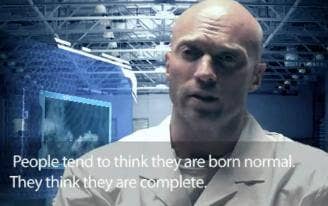EU Confronts Transhumanism With Technolife Project

Share
Europen Union nations hope to foster meaningful debate on ethics by showing people pop culture and SciFi inspired videos and getting them to comment on an open forum on the internet. Sure, why not, it worked for 4Chan, right? The Technolife Project seeks to understand how the world feels about three key emerging technologies: biometrics, human enhancement, and global mapping. Funded as part of the EU's FP7 Programme, the project's team is composed of ethicists, scientists, computer programmers and other professionals across several institutions led by the University of Bergen in Norway. To inspire the debates, Technolife has created 'imagined communities' - scenarios that embody the possible applications of the technology in question. Each scenario gets its own video, and you can watch all three below. They're like really weird scenes from bad science fiction movies (I love it!). If any of these clips set your brain afire feel free to jump on Technolife's debate threads and make yourself heard. Or just post your thoughts below. There are important comments to be made - to the forums!
I'm skeptical that meaningful public debates still exist in our world, let alone on the internet, but I find the EU's approach to this situation intriguing. As a government how do you actually ensure that the adoption of technologies are shaped in the best interest of the public rather than at the whim of special interests? Well, you could always just ask them. That's pretty much what's happening here. Technolife is contacting internet based news groups (like Singularity Hub) and asking us to point to their website and get people to talk about the future. I'm all for helping any group that lists the book Neuromancer and clips from the movie Blade Runner under its 'extra resources' tab. However, judging by the lack of action on the forums (there are less than 30 posts in the 'Digital Globes' board), things aren't going well so far. I don't think it's the fault of the videos, they all look fairly interesting.
Human enhancement, through surgical alterations, genetic manipulations, or cybernetic implants, could greatly increase what we are capable of, yet they also change our concept of humanity. The Technolife debate can be found here.
Biometrics, or using physical traits (fingerprints, iris scans, faces, DNA, etc), to identify people, has been heralded as both the means to secure borders against terrorists and as a major invasion of privacy. The Technolife debate can be found here.
Digital maps allow for a huge variety of information to be accessed through a single medium, but they also provide the means to track citizens and their behaviors everywhere. The Technolife debate can be found here.
Be Part of the Future
Sign up to receive top stories about groundbreaking technologies and visionary thinkers from SingularityHub.


Why are the Technolife forums so quite at the moment? It could be that they are still very young, or it could be that they require you to register for each of three debates separately. Or it could be that most people don't really care about these questions.
They should. These three topics are going to be huge in shaping government-citizen interactions in the future. Biometrics and digital maps will allow institutions (state or corporate) to follow your actions everywhere and to identify you by those actions. The convenience will be impressive, the potential for abuse likewise great. The debate around human enhancements is even more important. How will a government protect its citizens when it starts to have trouble defining what it means to be human? Will we be separated into normals and augments? Will there be different responsibilities and rights associated with each?
These technologies are emerging as we speak. India is adopting a universal biometric identification system. Digital mapping systems from Google, Bing and others are exploding with publicly produced and exchanged information. Human augmenting technologies are likely years away from production, but restorative technologies like cochlear implants are already engendering debates about how changing the body we are born with can affect cultural identity.
I'm not sure Technolife is the perfect place to discuss the ethics surrounding these issues. I'm not even sure if the project is really aimed at fostering a debate or is simply a mechanism for the EU to guide and control it. Doesn't matter really. The truth is we need to find some place to have meaningful debates on these topics and fast. If the public at large cannot command its governments in how they should regulate or encourage these technologies then other entities will. Do we want Google to define what should or should be on a map? Do we want a future where the laws surrounding the use of biometric IDs are defined by advertising agencies and banks? Do we want a future where human enhancements are only available to soldiers? Speak up now or regret it later.
[image and video credits: Technolife Project]
[source: Technolife, University of Bergen]
Related Articles

Aging Weakens Immunity. An mRNA Shot Turned Back the Clock in Mice.

AI Can Now Design Proteins and DNA. Scientists Warn We Need Biosecurity Rules Before It’s Too Late.

Kids With Spinal Muscular Atrophy Show Dramatic Improvement With FDA-Approved Gene Therapy
What we’re reading
